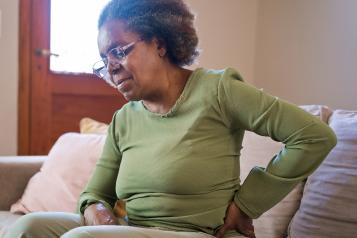Staying healthy when living under lockdown

Image source: Public Health England
Some facts about obesity
From our survey at the start of the session, we found some people are eating more healthily during lockdown while others reported eating less healthily.
Over half of the UK population are living with overweight or obesity, and the UK has the highest rate of obesity in Europe.
Obesity increases the risk of developing type 2 diabetes and cardiovascular disease. It is also associated with infertility, sleep apnoea, incontinence, and poor mental health.
- Knowing your height and weight allows you to calculate your BMI (body mass index). Calculate your BMI
- A BMI of 25-30 kg/m2 is classified as overweight, 30-35 kg/m2 as obesity and above 40 kg/m2 as severe obesity.
- Your waist and hip circumference are also really important. A high waist circumference or waist:hip ratio suggests there may be increased fat around your vital organs which can put you at higher risk of health problems. Read about how to measure yourself correctly and the healthy limits
There are four tiers of weight management service in the UK:
- Public health guidelines and national campaigns to promote healthy living and prevention of obesity. You can find a lot of information and resources on the UK Government and Public Health England websites.
- Community services often provided by your GP (e.g. community dietician, short-term gym membership) or private groups such as Weight Watchers and Slimming World.
- Hospital-based specialist services – medical doctors, dieticians, psychologists, exercise specialists
- Bariatric (weight-loss) surgery
Find out more about the four tiers of weight management service
Understanding the biology of appetite
Our biology and genetics give cues to our brain to control how and when we eat, which can have a huge impact on our body weight.
Ghrelin is the name of the hormone that gives you the feeling of hunger and is mostly produced in your stomach. There are also two hormones called GLP-1 and PYY that are released from your intestines to make you feel full.
When you eat, ghrelin reduces rapidly, making you feel less hungry, and over the next 30-60 minutes your hormones for fullness start to kick in. On average people tend to eat quite quickly, often in less than 10 minutes, which means our helpful hormone messages don’t always have time to influence our behaviour. Our genetics also control how much of these hormones our bodies can produce, so one person may produce more hunger hormone than another, and therefore tend to eat more, due to the genes they inherit. These hormones have powerful effects on our brain which controls our eating patterns, so don’t be too hard on yourself if you struggle to manage your appetite and weight.
Top tip: Eat more slowly. One way of doing this is chewing your food for longer. Counting how many times you chew and aiming for 10-20 times per mouthful can help you to do this. This gives you time to feel full (the GLP-1 and PYY can kick in) so you might save yourself from eating extra calories your body doesn’t need.
Healthy eating during the pandemic
For some, lockdown provided an opportunity to reflect and change or develop new eating habits. For others it was a struggle to maintain a healthy lifestyle. Disrupted routines and stress affected how and what individuals and families ate.
The immune system
- Eating well provides one’s body with the vitamins and minerals it needs to build and maintain a healthy immune system.
- It is important to eat fresh fruit and vegetables. Cooking can destroy some vitamins so it is better to eat them raw or steamed.
- Variety is key – you need all the vitamins not just one of them. Be careful to wash fruit and vegetables especially if you are going to eat them raw.
Healthy weight
Our basic nutritional needs have not changed much over time but our diet has. Our food is more processed, has added sugar, salt and fat. These make it tastier but in excess can be harmful. If you can, you should be intentional and disciplined about what you eat. The human body likes consistency.
- Avoid empty calorie foods – these are foods high in fat or sugar but no other nutrients, for example chips.
- If possible, cook from scratch rather than having a ready meal. Avoid fizzy drinks, and juices also contain a lot of sugar.
- There is a traffic light rating system on some foods detailing sugar, salt and fat contents. Green indicates low, amber is medium and red is high – Check the front of snack and breakfast cereal packets for these.
Staying active during the pandemic
Any physical activity uses energy. Sleeping uses the least amount of energy. Physical activity levels are categorised into:
- Sedentary activity such as sitting, computer work or reading. There are health risks associated with too much sedentary activity.
- Light activity includes cooking, walking, sweeping, shopping. If you want to test whether you are doing light activity or something more strenuous then if you can still sing it’s light.
- Moderate activity such as a brisk walk, cycling, dance. During moderate activity it is possible to talk but difficult to sing.
- Vigorous activity is more strenuous exercise such as running, swimming and playing sports. You feel breathless and you are less able to talk.
Benefits of exercise
Regular physical activity reduces your risk of disease, strengthens your bones and is good for your mental health. It is also anti-ageing.
UK guidelines for exercise are 150 minutes a week moderate physical activity or 75 minutes a week vigorous physical activity. Resistance training is also important to keep muscles, bones and joints strong. Do at least 2 days a week for example gym, yoga or carrying heavy shopping.
If you don’t meet the above guidelines you are classed as physically inactive. Sedentary behaviour is dangerous so try to break it up. You can use devices such as a wearable step counter (pedometer) or a step counter app downloaded on your phone to remind you if you have been sitting for too long.
Many of us have become more sedentary during the pandemic, which is dangerous. On the positive side, 1 in 3 of us have taken up home based exercise.
Support
If you are concerned about your weight and health, please do discuss this with your GP. There are many services and healthcare professionals available to help you manage your weight and lead a healthier lifestyle. One You Islington has useful information about a range of local services that can help.
We know that living with overweight and obesity can be difficult, both physically and emotionally. Unfortunately stigma and prejudice against obesity still exist in society. If you are having any difficulties, organisations such as Obesity Empowerment Network can support you with getting access to weight management services or simply provide someone to talk to who understands how living with obesity feels.
Thanks to our presenters
This information was provided by @RoxannaZakeri @FriedrichJassil and @Nyala_Balogun from the biomedical research team at UCLH at our 9 June Healthwatch meeting. Thanks to them for sharing their expertise. You can follow them on Twitter to learn more about their work. They often share useful information related to obesity and healthy living.


